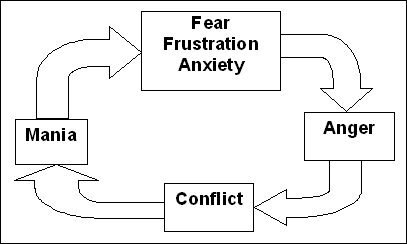David Baxter PhD
Late Founder
Bipolar Mania: A Vicious Cycle
By Joe Kraynak
August 5, 2009
Bipolar mania can really foul up the family dynamic. One minute, your family is cruising along on autopilot, and the next minute you’re in a tailspin. It can begin innocently enough with a barely perceptible increase in irritability and criticism, and then quickly escalate into knock-down, drag-out conflicts, all of which contribute to worsening the mania.
Recently, when I began feeling the ground shift under my family, I sketched out the cycle as I see it.
About Joe Kraynak: In 1999, my wife, Cecie, experienced her first major manic episode. She ended up in St. Vincent’s Stress Center, where she was diagnosed as having bipolar disorder. She has been hospitalized a total of three times – all for mania. She rarely experiences the debilitating depression that many people with bipolar disorder struggle with. We have two children together, both of whom are pretty much adults at this point. Over the past decade or so, we’ve struggled to coexist with this disease. At times, it seems to be a cruel puppet master pulling our strings to act out some demented drama on the stage we call our home. Most times, we manage to keep this beast chained up, through a combination of medicine and therapy, but occasionally it escapes and turns our home inside out. In 2005, I had the good fortune to co-author Bipolar Disorder For Dummies with Dr. Candida Fink. In the process, I learned a great deal about bipolar disorder and strategies for treating it, preventing major mood episodes, and dealing with the fallout when preventive measures are ineffective. Through this blog, I hope to share what I’ve learned about bipolar while I continue to discover even more.
By Joe Kraynak
August 5, 2009
Bipolar mania can really foul up the family dynamic. One minute, your family is cruising along on autopilot, and the next minute you’re in a tailspin. It can begin innocently enough with a barely perceptible increase in irritability and criticism, and then quickly escalate into knock-down, drag-out conflicts, all of which contribute to worsening the mania.
Recently, when I began feeling the ground shift under my family, I sketched out the cycle as I see it.
- Mania: Various factors can contribute to triggering a manic episode, and they can generally be broken down into two categories: biological and environmental. People with bipolar typically have a genetic vulnerability to bipolar, but then environmental factors, including stressors, trigger the expression of it – the mania or depression.
- Fear, Frustration, Anxiety: Loved ones, suspecting that another episode of mania is in the works, can begin to feel fear and anxiety over what’s happening and frustration over not being able to do anything to stop it. This is especially true if their attempts to help are rejected.
- Anger: Fear, anxiety, and frustration can express themselves as fear, anxiety, and frustration, but they can and do frequently find expression in anger.
- Conflict: Anger almost always leads to conflict, which feeds the mania the additional stress it needs to thrive. Mania is like an energy-eating monster. Blast it with TNT and even nuclear weapons, and the monster gobbles it up and grows bigger and stronger.
- Treating the mania: Medication and various forms of therapy can help quell the mania.
- Dealing with fear, frustration, and anxiety: Loved ones could benefit by seeking counseling themselves to determine ways of managing their emotional responses to very stressful conditions. Learning about bipolar is a great start, but it’s not enough when you’re actually involved in confrontations.
- Alleviating the anger: Fear, anxiety, and frustration can express themselves as fear, anxiety, and frustration, but they can and do frequently find expression in anger. Again, loved ones could benefit by practicing techniques for dealing with emotions more effectively and productively.
- Disengaging from conflict: Anger almost always leads to conflict, which feeds the mania the additional stress it needs to thrive. Mania is like an energy-eating monster. Blast it with TNT and even nuclear weapons, and it only gets bigger and stronger. When you feel attacked, instincts tell you to fight back. Disengaging, however, is often the better choice.
About Joe Kraynak: In 1999, my wife, Cecie, experienced her first major manic episode. She ended up in St. Vincent’s Stress Center, where she was diagnosed as having bipolar disorder. She has been hospitalized a total of three times – all for mania. She rarely experiences the debilitating depression that many people with bipolar disorder struggle with. We have two children together, both of whom are pretty much adults at this point. Over the past decade or so, we’ve struggled to coexist with this disease. At times, it seems to be a cruel puppet master pulling our strings to act out some demented drama on the stage we call our home. Most times, we manage to keep this beast chained up, through a combination of medicine and therapy, but occasionally it escapes and turns our home inside out. In 2005, I had the good fortune to co-author Bipolar Disorder For Dummies with Dr. Candida Fink. In the process, I learned a great deal about bipolar disorder and strategies for treating it, preventing major mood episodes, and dealing with the fallout when preventive measures are ineffective. Through this blog, I hope to share what I’ve learned about bipolar while I continue to discover even more.

